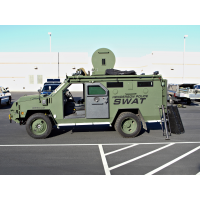In Rare Third Amendment Lawsuit, Nevada Police Accused of Forcibly Occupying a Private Residence
 Henderson Nevada police Swat vehicle (photo: gTarded, flickr)
Henderson Nevada police Swat vehicle (photo: gTarded, flickr)
The militarization of the police in America has come to this: for the first time ever a U.S. citizen is suing a local police department for arresting him, forcibly seizing his home at gunpoint and occupying it against his will, all in violation of the rarely cited Third Amendment to the Constitution.
In its entirety, the Third Amendment reads as follows:
No Soldier shall, in time of peace be quartered in any house, without the consent of the Owner, nor in time of war, but in a manner to be prescribed by law.
Anthony Mitchell and his parents, who live in the Las Vegas suburb of Henderson, Nevada, allege that local police violated their Third Amendment rights in July 2011 when they “conspired among themselves to force [him] out of his residence and to occupy his home for their own use.” His lawsuit also alleges violations of the Fourth and Fourteenth Amendments, as well as several tort claims.
Specifically, “on the morning of July 10th, 2011, officers from the Henderson Police Department responded to a domestic violence call at a neighbor’s residence,” the complaint alleges, and soon called Anthony Mitchell on the phone to state “that police needed to occupy his home in order to gain a ‘tactical advantage’ against the occupant of the neighboring house. Anthony Mitchell told the officer that he did not want to become involved and that he did not want police to enter his residence.”
Quoting from the official police report of one of the officers involved, the complaint alleges a premeditated armed attack by the police on Anthony Mitchell’s home:
“Defendant Officer David Cawthorn outlined the defendants’ plan in his official report: ‘It was determined to…attempt to contact Mitchell. If Mitchell answered the door he would be asked to leave. If he refused to leave he would be arrested for Obstructing a Police Officer. If Mitchell refused to answer the door, force entry would be made and Mitchell would be arrested.’”
According to the complaint, that is exactly what happened, as police used a battering ram to break down the front door:
“Although plaintiff Anthony Mitchell was lying motionless on the ground and posed no threat, officers…then fired multiple ‘pepperball’ rounds at plaintiff as he lay defenseless on the floor of his living room. Anthony Mitchell was struck at least three times by shots fired from close range, injuring him and causing him severe pain.”
After handcuffing and removing Anthony Mitchell, police decided they’d like the home of his parents, James and Linda Mitchell, who lived across the street, too. After tricking James Mitchell into leaving his house by falsely telling him they needed his help regarding the neighbor at their command post, police told him he could not return home and arrested him when he tried to go back.
Police arrested and jailed Anthony and Michael Mitchell for obstructing an officer, later dismissing all charges, which the complaint claims were filed “to provide cover for defendants’ wrongful actions, to frustrate and impede plaintiffs’ ability to seek relief for those actions, and to further intimidate and retaliate against plaintiffs.”
Although it has been 30 years since a federal court handed down a significant Third Amendment decision, and many scholars thought it had become a mere anachronism, the Third Amendment is actually an important part of the right of privacy. Originally adopted in 1791, the Third Amendment is often thought of as a response to Britain’s forcible quartering of troops in the Boston area in 1765, but its roots go much deeper than that, as the English Bill of Rights of 1689 included a criticism of recently deposed King James II for “quartering soldiers contrary to law.”
Although in the Mitchell case it was police rather than soldiers who forcibly occupied a residence, it is unlikely that such a distinction—made increasingly blurry by the ongoing militarization of the police—between one group of state-sanctioned armed men and another would be sufficient to defeat the claims.
For the record, the neighbor, Phillip White Jr., was arrested and charged, but all charges against him were dismissed.
-Matt Bewig
To Learn More:
Police Commandeer Homes, Get Sued (by Megan Gallegos, Courthouse News Service)
Henderson Family Sues Police for Breaking into their Homes (by Francis McCabe, Las Vegas Review-Journal)
‘Forgotten’ Third Amendment Surfaces in Nevada Case (by Jacob Gershman, Wall Street Journal)
Mitchell v. City of Henderson, Nevada (Complaint) (pdf)
- Top Stories
- Unusual News
- Where is the Money Going?
- Controversies
- U.S. and the World
- Appointments and Resignations
- Latest News
- Trump Offers to Return Alaska to Russia
- Musk and Trump Fire Members of Congress
- Trump Calls for Violent Street Demonstrations Against Himself
- Trump Changes Name of Republican Party
- The 2024 Election By the Numbers






Comments